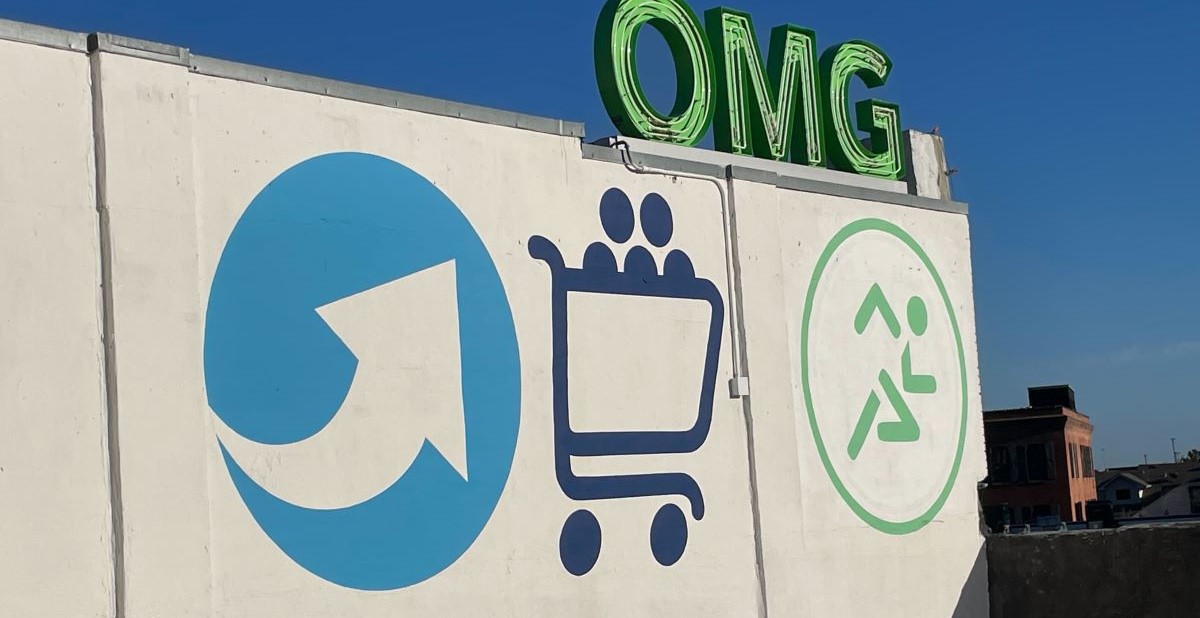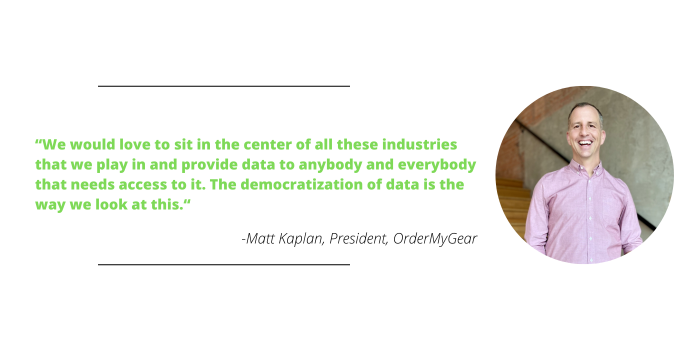What Does OMG’s Acquisition Of DistributorCentral Mean For Promo?

Matt Kaplan has a vision in mind for the future.
The president of OrderMyGear sits in a conference room in the company’s trendy, open-concept headquarters in Dallas’s East Quarter neighborhood discussing its recent acquisition of fellow business service provider DistributorCentral, an industry provider of product data. Above him, on the second floor, a feast is being prepared for the employees’ annual Thanksgiving lunch.
“We believe that we are going to have the most robust product database in the world,” Kaplan says. “We truly believe that.”
Almost exactly a year earlier, Kaplan sat in the same conference room with Vice President of Strategy Mykala Goodwin, who sits with him now, talking about OMG’s then recent acquisition of BrightStores. That meeting a year earlier included Tanya Iganacek-Sutton who was vice president of BrightStores and now serves as a senior vice president at OMG. Replacing Iganacek-Sutton in this early meeting is Rick Mitchell, CFO and COO of TradeNet Publishing, the supplier that previously owned a stake of DistributorCentral and has been an integral part of DistributorCentral’s mission and success.
Large scale acquisitions are starting to feel like an autumn tradition around here.
While the BrightStores deal might have seemed organic – a provider of online stores purchasing another provider of online stores – the DistributorCentral acquisition was a bit more unexpected and represents a next step for OMG, which operates in both promo and team sales.
- Eliminating friction and unnecessary logistics is paramount to the industry’s growth – something behind PPAI’s push of Promo Data Exchange, an inventory integration system and other similar systems that are prioritizing data.
“We look forward to a time when we’re feeding all of it,” Kaplan continues. “We would love to sit in the center of all these industries that we play in and provide data to anybody and everybody that needs access to it. The democratization of data is the way we look at this.”
That hypothetical future still leaves room for questions. In fact, Kaplan’s phone has been receiving plenty of well-wishing texts and calls since the deal went public. Most have quickly gotten to the point.
“Congratulations. Call me. What does this mean for me?”

Why Did DistributorCentral Choose To Merge?
DistributorCentral came out of TradeNet Publishing’s efforts to ensure distributors had access to its products without having to pay a fee. It operates on a subscription method in which suppliers pay a monthly fee to have their data hosted for distributors to access, a dynamic that improves the relationships and smooths the process for both parties.
- After 20 years, DistributorCentral’s technology has improved, and it hosts the data of approximately 400 core industry suppliers – that number being an intentionally set ceiling that OMG plans to raise drastically.
There were two primary reasons that DistributorCentral was seeking a larger company to partner with. The first is fairly common, if not universal, in acquisitions.
- OMG provided more resources for the company to grow.
“We were at a crossroads where we either needed to bring more resources to the table and be able to do more better or seek a partner,” says Mitchell. “OrderMyGear was the first potential partner we reached out to.”
- Beyond that, DistributorCentral faced headwinds in growing beyond those 400 suppliers because it was also owned in part by supplier TradeNet Publishing.
“Our primary customers – the people we serve – are industry suppliers,” Mitchell says. “There’s a natural hesitancy on the part of some suppliers in the industry to embrace a technology solution that's owned by somebody they consider one of their principal competitors.”
- Initially, that insider knowledge of a supplier was an asset to DistributorCentral becoming the best version of itself, but it had become a roadblock to continued growth.

“We want to be accessible to everyone and support the industry as a whole,” Mitchell says. “The ownership change was critical to that. It's just hard to trust somebody with your IT infrastructure that you see as a competitor. I think that's just a natural feeling.”
Mitchell also stressed that OMG and DistributorCentral had a “shared vision of really supporting the supplier/distributor relationship and continuing a path where we were making it easier for that relationship to continue and thrive."
Kaplan and Goodwin point toward OMG’s handling of the BrightStores acquisition as a selling point.
- After acquiring BrightStores, OMG committed 90 days to employee-focused integration without any concrete strategy implementation beyond that.
- OMG says there has been no employee attrition since the BrightStores acquisition a year ago.
- They claimed they could be “the best cultural steward of [DistributorCentral].
DistributorCentral, based out of Kansas, will bring all 13 of its employees to OMG. They will continue to work remotely or join the Dallas-based OMG offices if they desire.
“Their entire team does something that nobody else really does here,” Kaplan says.
TradeNet Publishing will no longer have an ownership stake in DistributorCentral and will only be a “very supportive customer.”

Why OMG Acquired DistributorCentral
Kaplan doesn’t always say he sells online stores when someone asks him what his job is. He tells people OMG is in the business of changing behaviors. Data is key to that business.
- Suppliers in the DistributorCentral database must go through a 400-point data check, looking for errors or redundancies that the supplier may not even be aware of. Until they are fixed, that product data is not exposed on the platform.
Those checks and balances lead to reliable data for OMG clients.
- Over the next year, OMG’s focus with DistributorCentral will be to bring more and more suppliers into the database.
- With OMG’s increased marketing capacities, it believes there is no limit to the number of suppliers it can convince to put product data on the system.
For Kaplan, who spent his early career at Under Armour, this data integration could lead to a blurring of markets between promo and team sales.
“For promo suppliers, that can be a very exciting proposition, because much of what we do applies to the team space directly,” Mitchell says.
Promo suppliers, Kaplan says, are opening themselves up to new markets simply by integrating their products data into a system that includes OMG’s team sales clients.
“For us, it’s old hat,” says Kaplan, speaking of markets outside of promo. “For them, it’s like a new frontier.”
OMG imagines a world where sales reps have to do nothing but sell and can log on to a platform with thousands of clients and an ability to launch a store for any client while having access to all the product data they might need.
“For distributors, it creates one ecosystem; one place for you to discover, sell, manage and order products,” says Goodwin. “For suppliers, it’s simplifying their data management and distribution to one place.”

What This Means For The Industry (A.K.A. What Changes?)
One question might be at the top of every distributor’s list: Will the pricing change?
- For the time being, DistributorCentral will remain free to distributors.
“We’re taking more of a pause and learning more about the business and just what makes sense before we make any decisions,” Goodwin says.
Mitchell’s role with the company going forward is not entirely established; he still works for TradeNet Publishing but is a crucial part of DistributorCentral’s transition with OMG. For his part, he mentioned that offering the service to distributors for free was an important part of the company’s success.
“We believe that the difference [from other data integration systems] is that we’re available to every distributor free of charge,” Mitchell says. “That’s been one of the core principles.”
- OMG has contracted a third-party consulting company to get a full understanding of what a pricing model might look like.
- One CEO of a PPAI 100 company said that their concern was that the pricing model would change in regard to suppliers from a subscription model to a transaction fee.
OMG’s visions for what this acquisition means for the future are based on many more hypothetical suppliers joining, and so the ramifications are not yet worth debating in detail. Two PPAI 100 CEOs have said that a relatively small percentage of sales come through DistributorCentral but suggested that such data product search engines can hold a reasonable amount of influence in purchasing decisions.
- But the process of eliminating friction in the promotional products industry through available and standardized data is one that will take buy-in to push the industry forward.
“When business service providers make a commitment to solving industry-specific challenges, they win and the industry wins,” PPAI President and CEO Dale Denham, MAS+, says. “This acquisition should create more opportunities for success. I’m particularly hopeful about the commitment from OMG to support PDX inventory and order status with this acquisition.”
For Goodwin, those opportunities come down to that idea of democratization of data.
“I think the root of it is just access,” Goodwin says. “There are 400 suppliers [in DistributorCentral] today. But there are 2,600 more that we can get added. And by adding that, it is now available through promo standards or PDX, or both.
“As long as we’re all providing access to the data, that’s really what matters.”
As far as big acquisitions becoming a yearly tradition for OMG, whose CEO, Leonid Rozkin, comes from the private equity investment space, Goodwin and Kaplan left that an open-ended question.
“We’re definitely always looking,” says Goodwin. “But it has to make sense. We wouldn’t do that just for the sake of acquiring a company.”

